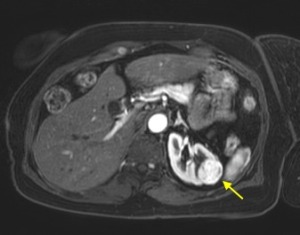by
John R. Fischer, Senior Reporter | January 05, 2018

Multiparametric MR allow physicians
to assess kidney cancer without
the need for a biopsy
A new approach in MR technology may offer insight on the nature and aggressiveness of kidney cancer without the need for a biopsy.
Investigators at the Kidney Cancer Program at UT Southwestern Harold C. Simmons Comprehensive Cancer Center have developed multiparametric MR (mpMR) protocols to indicate with high confidence if a tumor is aggressive, and to enable physicians to assess its chemical composition to infer the type of cancer present without the need for a biopsy. The findings were published in
The Journal of Urology.
“Renal biopsies are minimally-invasive tests but they are invasive after all. There is some level of discomfort and pain during the procedure,” radiology professor Dr. Ivan Pedrosa, chief of MRI at UT Southwestern and one of the co-authors of the study, told HCB News. “There is a small risk of bleeding, probably less than five percent. Another relevant one is that about 14 percent of biopsies are not diagnostic. In other words, the tissue sample that we obtained does not have sufficient quality to make a diagnosis of kidney cancer or to rule out the diagnosis of kidney cancer. So the patient undergoes the procedure and has no benefit from it.”



Ad Statistics
Times Displayed: 187485
Times Visited: 5620 For those who need to move fast and expand clinical capabilities -- and would love new equipment -- the uCT 550 Advance offers a new fully configured 80-slice CT in up to 2 weeks with routine maintenance and parts and Software Upgrades for Life™ included.
MR spares patients from radiation exposure and provides multiple images with different contrasts, each of which provides diverse insights on the composition of the renal mass tissue, enabling physicians to interpret the most likely form of cancer present.
The use of mpMR has enabled physicians at UT Southwestern to identify clear cell carcinoma (ccRCC), the most common and aggressive type of kidney cancer, with 80 percent confidence.
The technology utilizes a standardized diagnostic algorithm, then interprets results based on the appearance of the renal mass on specific MR images, namely T2-weighted images, and those immediately following the completed delivery of intravenous (IV) dye to the kidney.
Pedrosa says the use of mpMR has replaced the need for biopsies at UT Southwestern and he hopes that other health care organizations will utilize the technology to further improve it.
“The results are certainly encouraging but we’re not going to stop there,” he said. “We’re conducting studies at UT to further refine our approach and improve these results. In a way, the study illustrates, really, the value of teamwork. It has indeed replaced the need for biopsies at our institution. My hope is that it will continue to expand the role of MR not just at UT but at other medical centers around the world.”
The approach has also been used to assess other forms of cancer, including prostate. The investigators hope that the new technology, in the near future, will not only help in predicting the type of cancer present but also measure its aggressiveness.

